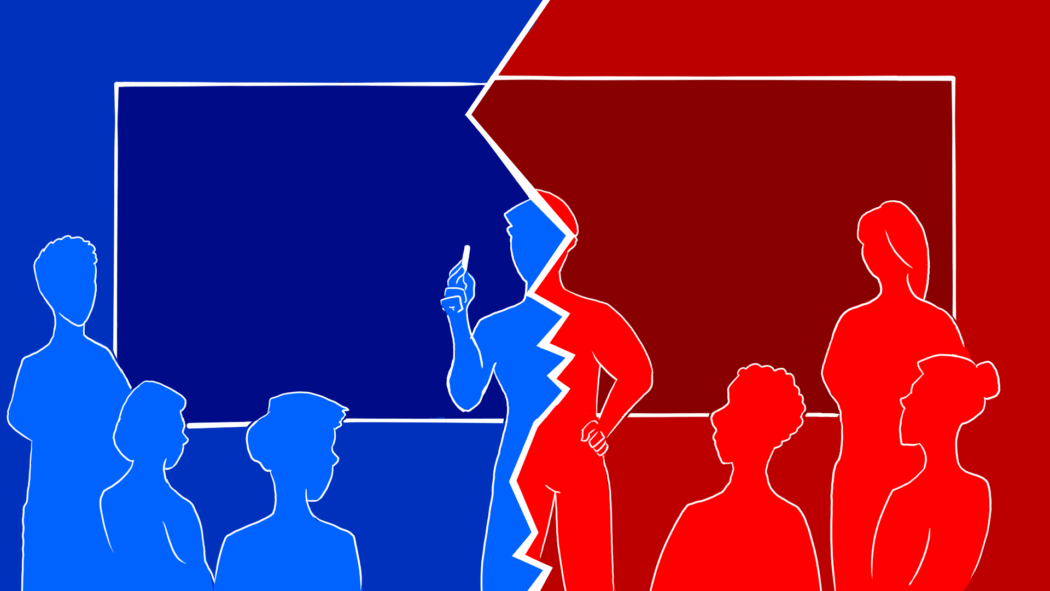Opinion: Polarization never belongs in the classroom
In today’s political scene, party views are the most divergent from moderate standpoints in history. With the country becoming more divided on matters of public policy, civil discourse is making way for disrespect and even violence.
This is a problem. Effective political discussions lead to compromise, allowing Congress to properly pass legislation.
Instead, the U.S. government opts to utilize executive orders and other means to bypass traditional methods of enacting laws, avoiding government standstills. But we still cannot escape government inefficiency due to their inability to compromise.
Historically, compromises have built solid policies and have allowed the U.S. to move past intense hardships. Many Americans want to see more compromise between Republicans and Democrats but refuse to give any ground when discussing specific policies.
Because many Republicans and Democrats see the other side as intolerable, polarization only becomes more pronounced until it damages the physical, emotional and social health of U.S. citizens.
It is no surprise then this affects university classrooms. Students see polarization within the classroom — usually when a professor or classmate discusses a polarizing political idea and is supported or shut down. This has a negative effect on classroom environments, as it merely continues the cycle of polarizing behavior and stops college students from actually learning.
Colleges and universities allow students pursuing higher education to interact with other students who come from different backgrounds. As a result, young college students experience interaction with contrary beliefs much more frequently. These interactions are often beneficial, as individuals can learn to appreciate other ways of thinking.
However, polarization has become more commonplace and aggressive, in part due to the coronavirus health crisis. Conversations about the politics of the crisis are bound to happen in university classrooms and the potential grows for education to be disrupted.
This is not to say that a healthy debate can’t be good to help resolve differences or expand on someone’s beliefs, but the traditional classroom is not a great place for debate. The role of a teacher is to ensure that students understand the information needed to competently navigate their field of study, not to dictate a student’s moral and political beliefs.
Some argue teachers are essential in shutting down misinformation or harmful ideas. This might be useful in pre-secondary education where students often lack the experience to fully understand the political opinions of their social circle. But once a student understands how to logically justify arguments and political stances, they shouldn’t be treated as a child. This will only alienate students from professors.
This is also an invitation for students to be more forgiving of educators who seem to dismiss their beliefs. Diving into tangential political discussions by disrupting class burns time that could be spent on relevant course work, so most professors avoid these discussions. This can lead students to believe a professor is intolerant or unsympathetic, which can disengage students from the class.
In short, polarization in the classroom makes learning harder for students and teaching harder for professors.
So why not ban all politics entirely from the classroom?
Because an outright ban of politics in a university classroom does more harm than good. For starters, university education builds interest in being politically active. The university should be ready to provide resources for students to constructively explore political beliefs.
Also, university courses cover a wide array of topics, some of which deal with polarizing content. Ignoring the issue harms students’ abilities to interact with controversial ideas civilly and makes the university and professors seem disconnected from reality.
Instead, let’s look outside the classroom and give both students and university professors some breathing space. There is success in simple conversations if there is enough time and effort to properly engage with difficult topics.
Let’s utilize one of the most important parts of college life: extracurricular organizations. By letting students with differing views discuss current events in a civil and understanding setting, more college graduates will become citizens who can do the same.
Understanding how to minimize polarization is important at any university, but it is especially important for Utah State University. Many of our students are Utah residents who have lived here their whole lives, while also many of our students come from all around the nation or the world.
The culture in Utah is unique from other states, which can be jarring for those new to the region. Having clubs or groups that provide spaces for interaction between individuals with different ideas, beliefs and political affiliations would let students capitalize on the vast diversity of opinions that exists in USU.
I haven’t been able to locate a group that specifically tackles this aspect of political engagement, but there is no shortage of university organizations that advocate positively for their respective ideals. While these groups’ goals are admirable, there are far fewer groups at USU that seek to bridge the ever-increasing divide between political parties.
If we want to avoid alienating students, we should seek to increase the opportunities available for civil discourse, without detracting from in-class education.

Bryant Saunders is a computer science major. He is a member of Utah State Speech and Debate and has an enthusiasm for discussing politics and philosophy.


This idea needs to happen, but I don’t know how to implement it. Echo chambers and safe spaces have always been intensely popular to humans everywhere. Magnified by the internet and MSM, people are able to find their comfort bubble and tend to dig in. The youth, as always, hold the key.